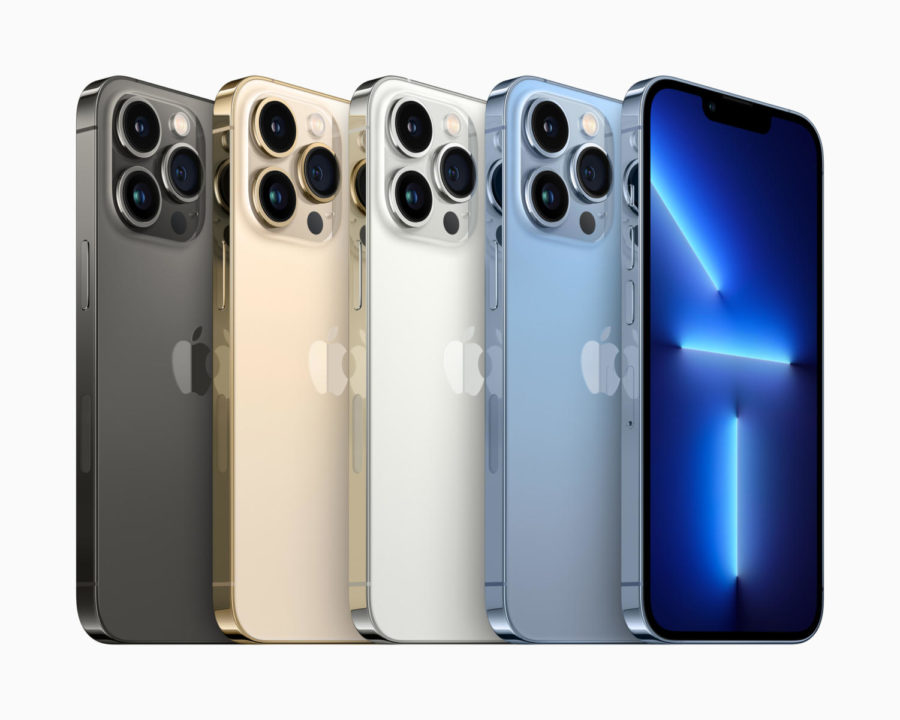The iPhone 13 is here. Does anyone care?
The new iPhone lineup is very similar to the last. Is that a bad thing?
September 17, 2021
It’s September again and like clockwork, Apple Inc. has unveiled their latest lineup of products, including a refreshed iPad, a new Apple Watch and, of course, the new iPhones. Since the introduction of the first iPhone ushered in the era of touch-screen smartphones in 2007, the world has completely changed, with everyone and their mother having a pocket-sized supercomputer able to access an infinite amount of information and communicate with each other at previously unthinkable speeds. Smartphones have revolutionized industries, disrupted politics and brought about social movements. And through it all, the iPhone has led the way, consistently being the highest selling smartphone model almost every single year. For many people, especially in the U.S. where Apple has an over 50% market share in smartphones, compared to Samsung’s 20-30% share, iPhones are simply the default smartphones, with millions looking forward to the new technologies that will be brought into their lives as each new model launches. So why does this year’s launch seem so, well, boring?
For years, iPhone launches have been spectacular events, always introducing some crazy new feature that will completely change the way we use smartphones, and therefore how we conduct our digital lives. Whether it be the introduction of the front-facing camera in the iPhone 4, the addition of TouchID in the iPhone 5S, the inclusion of NFC technology for mobile payments in the iPhone 6 or the full-screen design of the iPhone X, the iPhone jumped generationally from year to year, with new additions that genuinely made impacts on people’s usage. Over the past few years, however, Apple seems to have been hitting a point of diminishing returns. Sure, new tech is always being integrated, such as the Ultra-Wideband U1 chip in the iPhone 11 or the LiDAR scanner in the iPhone 12 Pro, but there is no way that I could explain how those additions have meaningfully changed the iPhone at all.
And perhaps that is the point. Smartphones are a maturing category of technology. We don’t expect laptops to blow our minds every single year that they come out anymore. We know what a laptop is and what we should expect whenever a new one releases: a screen and a keyboard and marginal improvements every once and a while. It seems to be getting to that point with the iPhone as well. This is best exemplified by the additions in Apple’s latest releases, the iPhone 13 and the iPhone 13 Pro. The headlining features of this year’s lineup include a new, more powerful chip, a better camera system, a better battery and in the case of the Pro, an improved screen. Of course, it goes a bit deeper than that, with the new cameras all having physically larger sensors, allowing for much better low-light photography and better stabilization, the new chip allowing for new video modes and in-depth photo customization, and the new screen on the Pro model having a much higher refresh rate, allowing for a buttery smooth scrolling experience. But these are alliterative updates. There is nothing really shocking or wildly new about these new iPhones, and really there doesn’t need to be right now.
Think about it. What do you really wish was different about your current phone? That it wasn’t as slow? That the battery would last longer? That it could take better pictures and videos for your TikTok and Instagram? Well, the iPhone 13 improves on all those things. While the magic days of constant surprise and awe are over, we are left with a consistently good product every year. Sure there is nothing that will really make everyone want to upgrade, but that might be better for all of us. Personally, I’ve had the same iPhone for four years now, when the norm not too long ago was to keep a smartphone for only two years. No longer being compelled to buy the latest and greatest just because it’s cool is ultimately a better thing for us consumers, but also better for the planet, with less e-waste generated each year.
While Apple’s reputation of constant innovation may be diminishing, its role as a staple in our lives will only continue, as the company continues to dominate our lives in other aspects, from music to television to credit cards to newspapers to physical fitness. So as long as they consistently make good products that act as a launching pad for the rest of our digital lives, there is nothing more that we can really ask for. So in the end, if you need a new iPhone, get a new iPhone, but don’t feel like you’re missing anything if you don’t.




